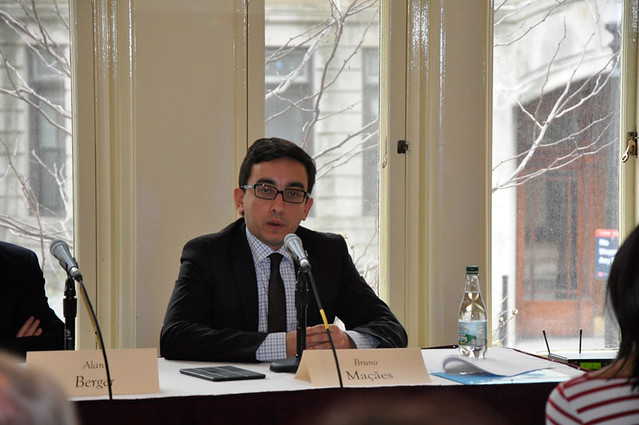Event Highlights: The Future of Europe – A Lecture by Bruno Maçães, State Secretary for European Affairs, Portugal
On Tuesday, April 8, the Center for the Study of Europe, in collaboration with the Center for Finance, Law & Policy and BU’s Undergraduate Economics Association, hosted the State Secretary for European Affairs in the government of Portugal as part of its “EU Inside Out” series. Maçães offered a Portuguese perspective on Europe’s future. The event was moderated by Alan Berger, retired editorial writer for international affairs, Boston Globe.
Contextualizing his remarks, Mr. Maçães introduced his topic to the audience by explaining that the European Union is “between two crises”: a financial crisis, and a crisis of security regarding the Ukraine in its relations with the EU and Russia. Portugal, where he acts as State Secretary for European Affairs, recently ended an EU-induced program of conditionality and reform that resulted in Portugal becoming the fastest-growing economy in the EU. With recent instabilities in mind, Maçães stated that, “we need a new strategy for Europe, and we need to think hard about what Europe should become after the crisis.” The EU was built on the foundation of “prosperity and peace for Europe”, but Maçães and many others argue that the current level of integration in the EU supersede this original goal, and that EU policies and goals must adjust to reflect that.
Maçães introduced the core dispute in the EU today as the dichotomy of integration and diversity. He argued unequivocally that the soft power of the EU, which has shown itself most recently in influence regarding Ukraine, is directly resultant from the EU’s diversity in cultures, opinions, economic policies, and education. He described the proper role of the EU as a “common space” for interaction, exchange, and ideas. Moving forward, however, he sees the structure of the EU as it exists today as unsustainable.
The recent financial crisis in the EU has been largely blamed on financial fragmentation across country lines, and the lack of a strong financial market for the EU itself. This has been compounded by the traditionally close relationship between states and banks, and made itself obvious during the crisis. For example, the policies of the European Central bank have proven to have drastically different effects in different states of the EU- in some cases, being so ineffective as to have the opposite effect of what was intended.
To combat this, Maçães argued that a banking union must be established in the EU (and indeed that this is in progress already). This would consist of a unified financial market for the EU. Financial markets incorporate more than currency and cash transfer- they includes decisions regarding plans for which goods will be produced, which companies will be supported, which ideas will be pursued, and more in the larger economy. The banking union in application would consist of separate political institutions aimed at preventing financial fragmentation along state lines.
Maçães also made a distinction between banking and fiscal unions. The more extensive fiscal unions could consist of integrated structures for revenue and expenditure, unemployment benefits, education, and more. These measures could be especially impactful due to opportunities for workers in the EU to work anywhere in the EU, rather than being confined to their home state. A proposed policy to begin enacting fiscal unity, for example, is the creation of an EU commissioner with the power to veto national budgets.
Maçães firmly denied the possibility of EU disintegration, citing European dedication to intercultural access. He allowed that many view the current EU as unsustainable and inappropriate in its role, but argued that the EU can and must complete its purpose in the future. If the EU is to step into its new role as a cosmopolitan space for communication and exchange, Maçães believes it must expand to become a space for political as well as economic interaction. He argued, however, that a single European state, or an EU too tightly connected, would cripple this structure that draws its true power from internal diversity.
Beginning at 40 minutes 17 seconds into the video, Maçães fielded questions regarding the economic responsibility of individual states, enforcement of policy for irresponsible member states, the significance of Ukraine to the EU, the role of fiscal unity in enforcing social spending, and clashes with Russia.
-Kaitlyn Perreault, ’18
Watch the full video on BUniverse:

